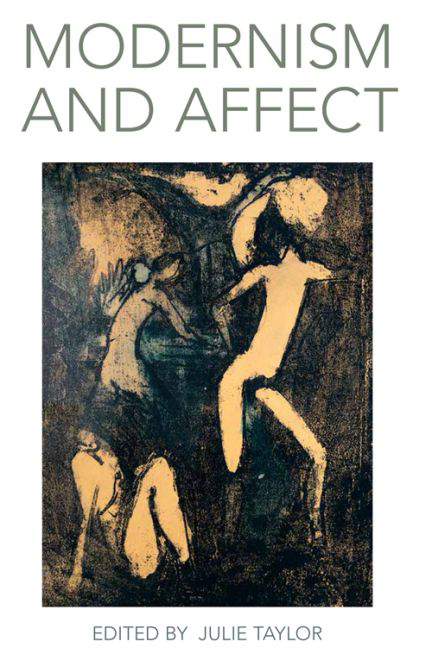Book contents
- Frontmatter
- Contents
- List of Illustrations
- Acknowledgements
- Notes on Contributors
- Introduction: Modernism and Affect
- 1 Mind, Body and Embarrassment in Henry James's The Awkward Age
- 2 The Trauma of Form: Death Drive as Affect in À la recherche du temps perdu
- 3 Logic of the Heart: Affective Ethical Valuing in T. E. Hulme and Max Scheler
- 4 The Line that Binds: Climbing Narratives, Ropework and Epistolary Practice
- 5 The Amplification of Affect: Tension, Intensity and Form in Modern Dance
- 6 Love and the Art Object
- 7 Animating Cane: Race, Affect, History and Jean Toomer
- 8 Fear and Precarious Life after Political Representation in Baudelaire
- 9 Bloom-Space of Theory: The Pleasure and the Bliss of Gerty MacDowell
- 10 From Odysseus to Rotpeter: Adorno and Kafka, Mimicry and Happiness
- 11 Making Happy, Happy-making: The Eameses and Communication by Design
- Index
10 - From Odysseus to Rotpeter: Adorno and Kafka, Mimicry and Happiness
Published online by Cambridge University Press: 15 September 2017
- Frontmatter
- Contents
- List of Illustrations
- Acknowledgements
- Notes on Contributors
- Introduction: Modernism and Affect
- 1 Mind, Body and Embarrassment in Henry James's The Awkward Age
- 2 The Trauma of Form: Death Drive as Affect in À la recherche du temps perdu
- 3 Logic of the Heart: Affective Ethical Valuing in T. E. Hulme and Max Scheler
- 4 The Line that Binds: Climbing Narratives, Ropework and Epistolary Practice
- 5 The Amplification of Affect: Tension, Intensity and Form in Modern Dance
- 6 Love and the Art Object
- 7 Animating Cane: Race, Affect, History and Jean Toomer
- 8 Fear and Precarious Life after Political Representation in Baudelaire
- 9 Bloom-Space of Theory: The Pleasure and the Bliss of Gerty MacDowell
- 10 From Odysseus to Rotpeter: Adorno and Kafka, Mimicry and Happiness
- 11 Making Happy, Happy-making: The Eameses and Communication by Design
- Index
Summary
The happiness of thought, the promise of its truth, lies in sublimity alone.
(Adorno 1996: 364)Tales of Brave Odysseus
Despite his location in antiquity, for Adorno and Horkheimer, in Dialectic of Enlightenment (1944), Odysseus is the ur-figure of the modern bourgeois: the archetypical middle-man who uses contracts and cunning to outwit and differentiate himself from nature but who relinquishes primal happiness as the price of doing so. Indeed, in Dialectic of Enlightenment, Odysseus sounds from the depths of the epic poem to tell us how Western civilisation is faring today; his expert grip on life, achieved by renouncing its sweeter fruits, favours a reality principle over a pleasurable one and a compromised existence over a life led more dangerously. In contrast to, say, Hegel's lord from the Phenomenology, who gains his power by showing in battle that he is fearless for himself – ‘not attached to life’, in Hegel's expression – the risk-averse Odysseus is tightly wedded to self-preservation, a tendency that, for Adorno and Horkheimer (somewhat in the spirit of Nietzsche and Freud), is key to his rejection of happiness (1977: 113). As I will discuss, happiness, for Adorno, always seems to involve openness to alterity, not smug self-control or palliative amusement; arguably, Odysseus's smooth selfreproduction resembles that of the machine, balancing repetition with growth, Thanatos with Eros, and novelty with habit.
Such impressive productivity, however, requires actual labour. And discussing the troubled genealogy of the self, the writers of Dialectic of Enlightenment tell us that ‘the strain of holding the I together adheres to the I in all stages; and the temptation to lose it has always been there with the blind determination to maintain it’ (Adorno and Horkheimer 1995: 33). Lisa Yun Lee notes that the rowing sailors in Adorno and Horkheimer's account of Homer represent the appropriated body of the worker (2005: 3); the strain that Odysseus as overseer feels thus gathers up the whole structure of the division of labour.
- Type
- Chapter
- Information
- Modernism and Affect , pp. 185 - 202Publisher: Edinburgh University PressPrint publication year: 2015



